Four Decades Later, Local Vietnam Vets Step Out of Shadows
By Bill Slocum
Contributing Editor
Contributing Editor
The three men at a table in
Stamford’s City Limits diner have two things in common. All served their
country in Vietnam, seeing extensive combat; all eventually settled in
Greenwich, where each has lived for years.
Until now, they never met.
“I never knew there would be another
Vietnam veteran in Greenwich,” says Roger Paulmeno, who went on scout
patrols with the First Air Cavalry as a helicopter door gunner until a
phosphorous grenade burned much of his body and took him out of action
five months and one day into his tour of duty.
“It’s not the kind of town where people
went to Vietnam,” adds Ed Vick, like Paulmeno an Old Greenwich resident
who cruised the Mekong Delta in a Navy patrol boat during his second
Vietnam tour, from 1968-69.
Bob Moore, a central Greenwich resident
for over 30 years who recently relocated to Stamford, patrolled the
jungle highlands outside Da Nang as an Army foot soldier. “I was pretty
heavily involved with the Greenwich Boy Scouts,” he says. “A lot of
those guys had military backgrounds, but no one else I knew of served in
Vietnam.”
Vietnam veterans have lived in Greenwich
since before the end of the war, if quietly. Bruce Winningham, head of a
local organization dedicated to servicing veterans, the Greenwich
Military Covenant for Care, has identified at least 50 Vietnam veterans
in town, and reports the sense of isolation described by Paulmeno, Vick,
and Moore is not unusual. Winningham says the local Vietnam veterans he
has met tend not to know one another’s names.
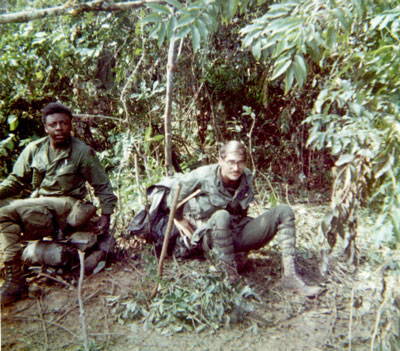 |
| Lt. Moore takes a break in the fighting somewhere in the jungle west of Chu Lai, with staff sergeant Roger Howard, sitting on their helmets in the mud. (photo contributed) |
Vietnam experiences were something the
veterans themselves were not eager to share for a long time after
returning. “By the time I moved to Greenwich, in 1972, I had learned,
sadly, that it was smarter not to talk about it, if you wanted to have a
job or friends,” says Vick, who for years worked in advertising at
Young & Rubicam.
Moore, a retired financial software
developer, was only a little less reticent. “I don’t think I was ever
reluctant to tell my story if the subject came up, but I never
volunteered it,” he says.
Today, however, the floodgates are open.
The three men swap stories in their collective ’Nam argot about misread
MOS, unreliable ARVN, and close encounters with B-40s. Often the room
fills with boisterous laughter.
The three men’s service in Vietnam
dovetailed in two different ways. First, each fought the war
differently—Moore on land, Vick on water, and Paulmeno in the air.
Second, they served near-consecutive but never simultaneous tours, Vick
from 1967-69, Paulmeno from February to July, 1970, and Moore from
November, 1970 to late 1971.
At one point in their three-way
conversation, Vick and Paulmeno realize they are talking about combat in
the same place, a wedge of Cambodia extending into the South Vietnamese
province of Tây Ninh, known as “the Parrot’s Beak.”
“It was a hotbed of activity,” explains
Vick, who patrolled the riverine network around the Beak in the anxious
months after a momentous North Vietnamese attack known as the Tet
Offensive. “That was their principal conduit into Saigon, and they could
travel it with impunity.”
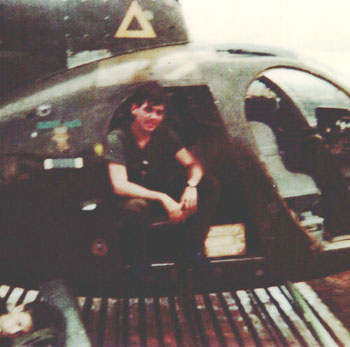 |
| Sgt. Paulmeno at the door of his light-observation helicopter, where he was stationed as a gunner. (photo contributed) |
When Paulmeno flew over there on July 4,
1970, the Beak had calmed down a little, enough that he was surprised to
spot soldiers camped out in a supposedly off-limits area.
Then he realized they weren’t American
soldiers, but Chinese. A battle commenced, with Sgt. Paulmeno’s tiny
light observation helicopter doing its usual job of drawing fire so that
a bigger Cobra copter it flew in tandem with could pick out targets to
shoot at. The Cobra ran out of ammunition; all Paulmeno had left was a
phosphorous grenade, which he threw out the side of his copter. For some
reason, it flew back in, landing in Paulmeno’s lap.
By the time he had thrown the sputtering
explosive back outside, he had sustained extensive burns to his arms,
legs, and face. Instantly he lost his vision, which would only return
partially over time and would leave his irises clouded over. The
fingertips of his right hand were destroyed; today those fingers remain
shortened and deformed.
“I think on one hand I’m luckier than
these guys, only because of what happened to me,” Paulmeno says.
“Because I have the scars to prove something happened.”
The other two experienced culture shock, going from a battle zone to civilian life in a matter of hours.
Vick recalls attending college after his
return from Vietnam, where an instructor in one classroom pointed out
Vick’s service to the class. For a month and a half, the other 34
students ignored him.
“They completely froze me out,” he says.
“Finally, I ended up talking to the craziest guy in the class, and
broke down some barriers. I said: ‘What was that about?’ He said: ‘We
figured you were a rapist and a baby-killer, because that’s what we
hear.’”
In fact they were survivors, having seen
violence close up, losing friends, and fighting to stay alive. Instincts
honed in battle did not soon go away.
“My wife tells a funny story,” Moore
says. “I was freshly back, and with one of my buddies who had been in
the 101st (Airborne Division) in Vietnam at my apartment on 57th Street.
A car backfires, and instantaneously this guy and I both go over a
couch and lie flat on the floor.”
On his PBR (Patrol Boat, River), Vick, a
Navy lieutenant junior grade, cruised narrow brown-water rivers in
search of the enemy. Firefights occurred every couple of days, he
recalls, the enemy usually opening up all of a sudden. “The noise is so
deafening, it’s almost like silence because it’s so loud,” he says. The
rivers were often so narrow, a PBR had no choice but to race through
fields of fire as quickly as possible.
“My first firefight, my boat was sunk right underneath me,” Vick recalls. “It was a rude awakening.”
For his part, Moore, an Army lieutenant,
remembers firefights occurring “once a week,” with the enemy suddenly
opening fire from just a few yards away. “You were right on top of them
when you engaged them,” he says. “We were trying to do our mission, and stay alive, and watch our buddies’ backs.”
As dangerous as patrol duty was, Moore
says his most hazardous posting was in the rear, with the battalion
support company. “Everyone was very straight out in the jungle,” he
says. “But in the rear area, you had to worry about a crazy guy rolling a
grenade into your tent at night.”
As the three men talked, they disagreed on one point: Who had it worse.
For his part, Moore marvels at the
helicopters who flew into firefights to rescue wounded soldiers. Vick
says he felt safer on a boat that he would have on land.
“I felt good I wasn’t these guys,” Paulmeno says. “Because we could fly away. They were stuck.”
Paulmeno has spent the last 35 years
working with other Vietnam veterans, as a therapist with the Vet Center
in White Plains, N.Y. Even when he was in a hospital recovering from his
wounds, he was asked to look after other patients. He says his own
recovery began there.
“I’ve been hearing stories for 30 years,” he says. “My own story wasn’t Vietnam, it was the hospital.”
For Vick and Moore, the road back started
in the mid-1980s. That was when efforts to recognize the service of
Vietnam War veterans began in earnest, especially after construction of
the Vietnam War Memorial in 1982.
“The Wall, I think, was the turning
point,” says Moore, referring to the Memorial’s popular designation.
“Until the Wall went up, there wasn’t the affirmation of our service.”
Vick describes himself as being “in the
closet” about Vietnam until about that time, when he got involved with
the New York Vietnam Veterans Memorial Commission.
In recent years, both Vick and Moore have
been helping veterans of a later era. Moore sent care packages to
troops in Iraq and Afghanistan. Vick works in a program called “Give An
Hour,” connecting returning Iraq and Afghanistan veterans suffering from
post-traumatic stress disorder with social workers who donate their
time one hour at a time. Vick also puts in time escorting World War II
and Korean War veterans to honor ceremonies.
“I have been working with Iraq and
Afghanistan veterans for ten years,” Vick says. “I have to tell you,
maybe because all these years I’m looking for something about Vietnam to
feel good about, but it makes me feel good. You always want to make a
difference.”
Today, the Greenwich Military Covenant
for Care works with Iraq and Afghanistan veterans in town looking for
help readjusting to civilian life. “We had one of our young men who was
raised in town and served in Iraq,” says Mary Jane Huffman, a volunteer
with the Covenant. He said: ‘People welcomed me, they thanked me for my
service, and I don’t think that would have happened had people not learned from Vietnam.’”
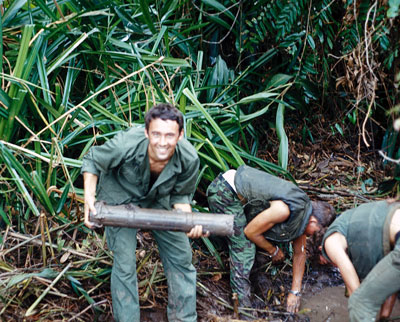
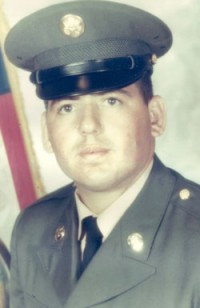
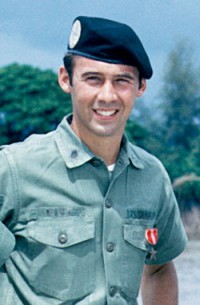
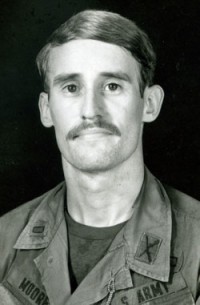
No comments:
Post a Comment
Note: Only a member of this blog may post a comment.